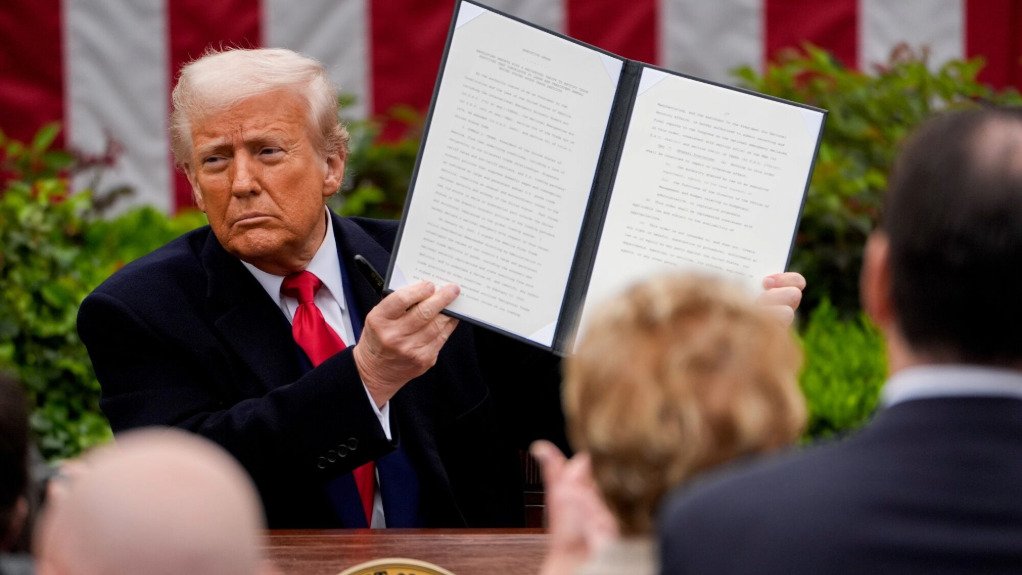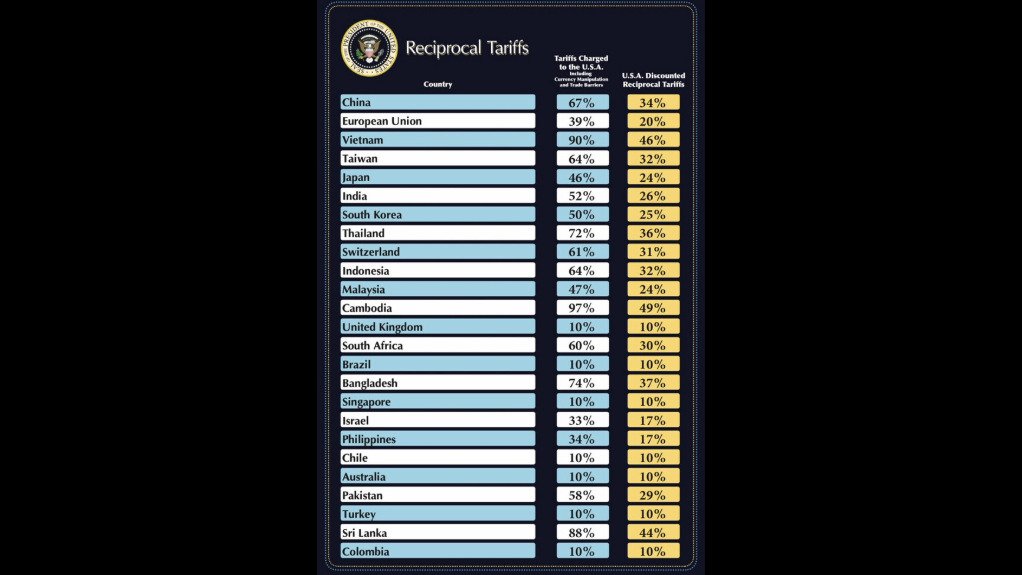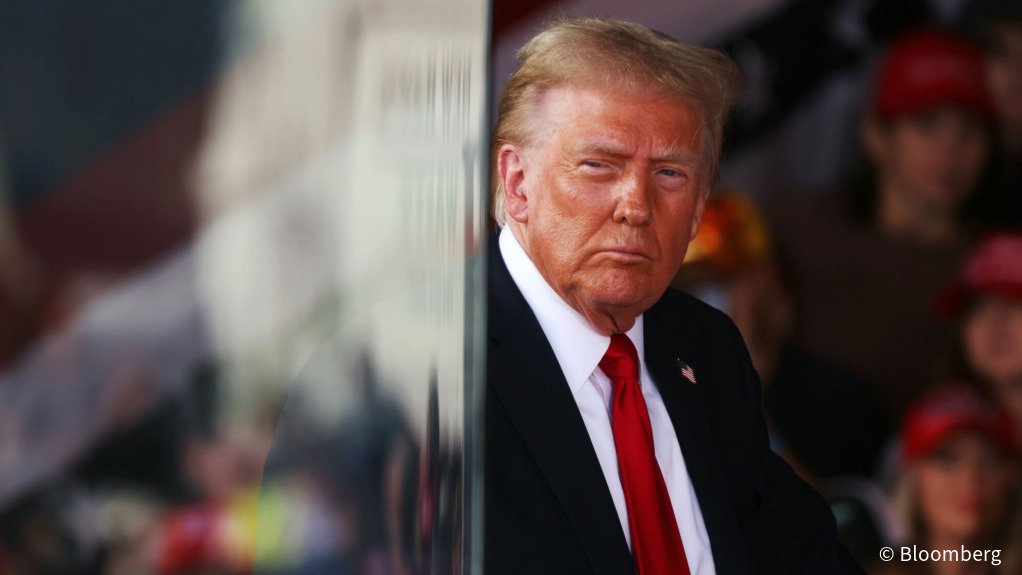South Africa’s Presidency has expressed concern over new tariffs that have been imposed on South African exports to the US following President Donald Trump’s April 2 'Liberation Day' announcement.
Trump said “reciprocal tariffs” of 30% would be implemented on South Africa, while also imposing a 10% base tariff, alongside higher individual tariffs for specific countries, including 20% for the EU, 24% for Japan, 26% for India and 34% for China.
“Whilst South Africa remains committed to a mutually beneficial trade relationship with the United States, unilaterally imposed and punitive tariffs are a concern and serve as a barrier to trade and shared prosperity.
“The tariffs affirm the urgency to negotiate a new bilateral and mutually beneficial trade agreement with the US, as an essential step to secure long-term trade certainty,” the Presidency said in a statement issued on April 3.
VERY BAD FOR SOUTH AFRICA
Trade specialist Donald MacKay, of XA Global Trade Advisors, said the development was “very bad” for South Africa, which exported about R153-billion to the US in 2024, making it South Africa’s second-largest export destination.
It also effectively ended the country’s African Growth and Opportunity Act (Agoa) eligibility, despite an ongoing review of the country’s status in this regard.
While highlighting that South Africa’s tariffs averaged only 7.5% compared with Trump’s claim that the country “charged the USA” 60%, MacKay cautioned that “facts don’t matter” and the fallout would be negative, particularly for BMW and Mercedes-Benz South Africa, which both export luxury cars to America.
“The President also announce a 25% tariff on autos and it’s not clear where the 30% encapsulates the 25%, or if it is on top of. But either way, selling those two cars into the US is going to be a problem.”
The US is South Africa’s third-largest destination for South African automotive exports, and shipped some R35-billion-worth of vehicles in 2024, or 6.5% of total vehicle exports last year.
In a statement, naamsa | The Automotive Business Council also expressed its concern and CEO Mikel Mabasa expressed hope that the “South African government will activate all available diplomatic channels” to urgently seek clarity on Agoa’s future.
Should the 30% also apply to South Africa’s platinum group metals exports, MacKay cautioned that it would have serious cost consequences for US automakers, which had few alternative sources of supply.
However, the Minerals Council South Africa says platinum group metals, coal, gold, manganese, and chrome have been specifically excluded from the tariffs, but raised concern over the inclusion of iron-ore and diamonds in the 30% reciprocal-tariff basket.
“Despite the exclusions, we remain concerned about the adverse impact on business and consumer sentiment and the resultant feedthrough to business investment, consumer spending and ultimately global real GDP growth caused by this unprecedented upheaval in world trade.
"Global growth coming under threat is bad news for the entire South African mining industry,” says Hugo Pienaar, chief economist at the Minerals Council.
Likewise, MacKay questioned the sense in applying the 30% to South Africa’s agricultural exports, as most of these exports were “counter seasonal” and, thus, did not compete directly with US farmed products.
South Africa’s steel and aluminium exports, meanwhile, would also be negatively affected.
MacKay was concerned that workers and businesses in the Eastern Cape (automotives), KwaZulu-Natal (aluminium), Western Cape (citrus), and Gauteng (automotives) would be hurt directly by the development.
In addition, the indirect impacts could also be large, as other products from those countries also hit with high US tariffs “look to find a home”, probably at a lower price point than can be achieved by domestic suppliers.
“So I would expect to see tariff applications increase, along with antidumping applications and safeguard actions . . . as countries try to deal with all of this global surplus that is looking for a place,” he says, adding that South African exports would also now have to compete within that global surplus.
North West University Business School’s Professor Raymond Parsons described the tariffs as posing a “serious headwind for South Africa”, while driving a “huge wedge into the world’s multilateral trading system”.
He also highlighted the specific threat posed to the automotive sector, but urged South Africa to be pragmatic and evidence-based in its response.
“In seeking to manage higher US trade tariffs, South Africa must mobilise the necessary economic diplomacy to try to offset the economic damage and stabilise the situation.
“Given President Trump’s reciprocal approach to tariffs, South Africa must see what trade adjustments might be made to win concessions to ameliorate the situation,” Parsons added.
ON POSTER DISPLAY
The 30% tariffs against South Africa were included in a poster display held up by Trump during his Rose Garden address, during which he said: “South Africa, oh, they’ve got some bad things going on. We’ve [been] paying them billions of dollars, so we cut the funding, because a lot of bad things are happening in South Africa.”
Prior to the April 2 address, Trump slammed South Africa’s newly enacted Expropriation Act and offered Afrikaner farmers refugee status, falsely alleging that their land was being expropriated without compensation.
His administration has also withdrawn some $8-billion in yearly funding to combat HIV/Aids in South Africa, exited the Just Energy Transition Partnership, to which it had pledged some $1.5-billion, and expelled then South African ambassador to the US Ebrahim Rasool.
Trump announced the new tariffs after declaring that foreign trade and economic practices had created a national emergency that required “responsive tariffs to strengthen the international economic position of the United States and protect American workers”.
In a fact sheet released together with the announcement, the White House said the tariffs would address “unfair tariff disparities and non-tariff barriers" imposed by other countries, and said the following specifically about South Africa’s policies: “For decades, South Africa has imposed animal health restrictions that are not scientifically justified on US pork products, permitting a very limited list of US pork exports to enter South Africa.
"South Africa also heavily restricts US poultry exports through high tariffs, anti-dumping duties, and unjustified animal health restrictions.
"These barriers have contributed to a 78% decline in US poultry exports to South Africa, from $89-million in 2019 to $19-million in 2024.”
EMAIL THIS ARTICLE SAVE THIS ARTICLE ARTICLE ENQUIRY FEEDBACK
To subscribe email subscriptions@creamermedia.co.za or click here
To advertise email advertising@creamermedia.co.za or click here















